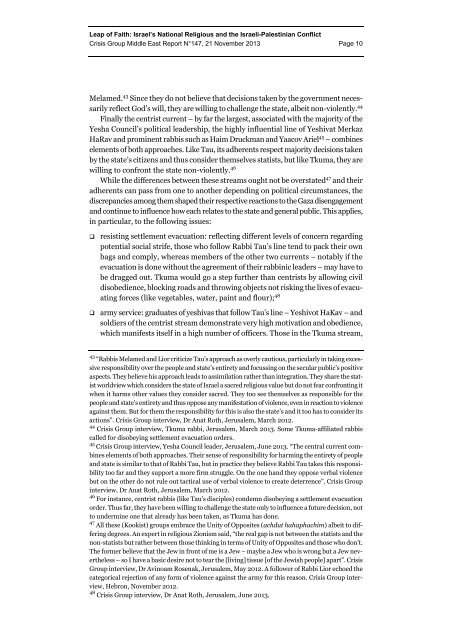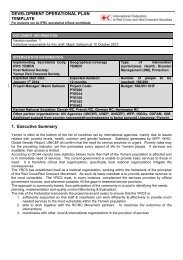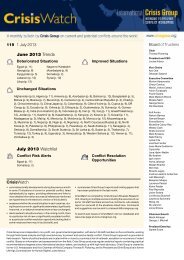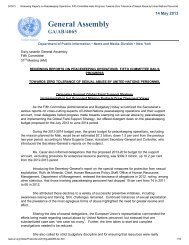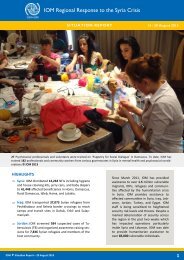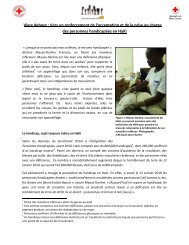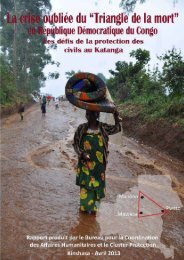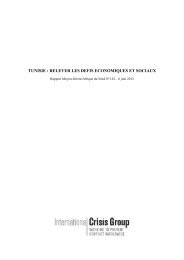Leap of Faith: Israel's National Religious and the Israeli ... - ReliefWeb
Leap of Faith: Israel's National Religious and the Israeli ... - ReliefWeb
Leap of Faith: Israel's National Religious and the Israeli ... - ReliefWeb
Create successful ePaper yourself
Turn your PDF publications into a flip-book with our unique Google optimized e-Paper software.
<strong>Leap</strong> <strong>of</strong> <strong>Faith</strong>: Israel’s <strong>National</strong> <strong>Religious</strong> <strong>and</strong> <strong>the</strong> <strong>Israeli</strong>-Palestinian Conflict<br />
Crisis Group Middle East Report N°147, 21 November 2013 Page 10<br />
Melamed. 43 Since <strong>the</strong>y do not believe that decisions taken by <strong>the</strong> government necessarily<br />
reflect God’s will, <strong>the</strong>y are willing to challenge <strong>the</strong> state, albeit non-violently. 44<br />
Finally <strong>the</strong> centrist current – by far <strong>the</strong> largest, associated with <strong>the</strong> majority <strong>of</strong> <strong>the</strong><br />
Yesha Council’s political leadership, <strong>the</strong> highly influential line <strong>of</strong> Yeshivat Merkaz<br />
HaRav <strong>and</strong> prominent rabbis such as Haim Druckman <strong>and</strong> Yaacov Ariel 45 – combines<br />
elements <strong>of</strong> both approaches. Like Tau, its adherents respect majority decisions taken<br />
by <strong>the</strong> state’s citizens <strong>and</strong> thus consider <strong>the</strong>mselves statists, but like Tkuma, <strong>the</strong>y are<br />
willing to confront <strong>the</strong> state non-violently. 46<br />
While <strong>the</strong> differences between <strong>the</strong>se streams ought not be overstated 47 <strong>and</strong> <strong>the</strong>ir<br />
adherents can pass from one to ano<strong>the</strong>r depending on political circumstances, <strong>the</strong><br />
discrepancies among <strong>the</strong>m shaped <strong>the</strong>ir respective reactions to <strong>the</strong> Gaza disengagement<br />
<strong>and</strong> continue to influence how each relates to <strong>the</strong> state <strong>and</strong> general public. This applies,<br />
in particular, to <strong>the</strong> following issues:<br />
resisting settlement evacuation: reflecting different levels <strong>of</strong> concern regarding<br />
potential social strife, those who follow Rabbi Tau’s line tend to pack <strong>the</strong>ir own<br />
bags <strong>and</strong> comply, whereas members <strong>of</strong> <strong>the</strong> o<strong>the</strong>r two currents – notably if <strong>the</strong><br />
evacuation is done without <strong>the</strong> agreement <strong>of</strong> <strong>the</strong>ir rabbinic leaders – may have to<br />
be dragged out. Tkuma would go a step fur<strong>the</strong>r than centrists by allowing civil<br />
disobedience, blocking roads <strong>and</strong> throwing objects not risking <strong>the</strong> lives <strong>of</strong> evacuating<br />
forces (like vegetables, water, paint <strong>and</strong> flour); 48<br />
army service: graduates <strong>of</strong> yeshivas that follow Tau’s line – Yeshivot HaKav – <strong>and</strong><br />
soldiers <strong>of</strong> <strong>the</strong> centrist stream demonstrate very high motivation <strong>and</strong> obedience,<br />
which manifests itself in a high number <strong>of</strong> <strong>of</strong>ficers. Those in <strong>the</strong> Tkuma stream,<br />
43 “Rabbis Melamed <strong>and</strong> Lior criticize Tau’s approach as overly cautious, particularly in taking excessive<br />
responsibility over <strong>the</strong> people <strong>and</strong> state’s entirety <strong>and</strong> focussing on <strong>the</strong> secular public’s positive<br />
aspects. They believe his approach leads to assimilation ra<strong>the</strong>r than integration. They share <strong>the</strong> statist<br />
worldview which considers <strong>the</strong> state <strong>of</strong> Israel a sacred religious value but do not fear confronting it<br />
when it harms o<strong>the</strong>r values <strong>the</strong>y consider sacred. They too see <strong>the</strong>mselves as responsible for <strong>the</strong><br />
people <strong>and</strong> state’s entirety <strong>and</strong> thus oppose any manifestation <strong>of</strong> violence, even in reaction to violence<br />
against <strong>the</strong>m. But for <strong>the</strong>m <strong>the</strong> responsibility for this is also <strong>the</strong> state’s <strong>and</strong> it too has to consider its<br />
actions”. Crisis Group interview, Dr Anat Roth, Jerusalem, March 2012.<br />
44 Crisis Group interview, Tkuma rabbi, Jerusalem, March 2013. Some Tkuma-affiliated rabbis<br />
called for disobeying settlement evacuation orders.<br />
45 Crisis Group interview, Yesha Council leader, Jerusalem, June 2013. “The central current combines<br />
elements <strong>of</strong> both approaches. Their sense <strong>of</strong> responsibility for harming <strong>the</strong> entirety <strong>of</strong> people<br />
<strong>and</strong> state is similar to that <strong>of</strong> Rabbi Tau, but in practice <strong>the</strong>y believe Rabbi Tau takes this responsibility<br />
too far <strong>and</strong> <strong>the</strong>y support a more firm struggle. On <strong>the</strong> one h<strong>and</strong> <strong>the</strong>y oppose verbal violence<br />
but on <strong>the</strong> o<strong>the</strong>r do not rule out tactical use <strong>of</strong> verbal violence to create deterrence”. Crisis Group<br />
interview, Dr Anat Roth, Jerusalem, March 2012.<br />
46 For instance, centrist rabbis (like Tau’s disciples) condemn disobeying a settlement evacuation<br />
order. Thus far, <strong>the</strong>y have been willing to challenge <strong>the</strong> state only to influence a future decision, not<br />
to undermine one that already has been taken, as Tkuma has done.<br />
47 All <strong>the</strong>se (Kookist) groups embrace <strong>the</strong> Unity <strong>of</strong> Opposites (achdut hahaphachim) albeit to differing<br />
degrees. An expert in religious Zionism said, “<strong>the</strong> real gap is not between <strong>the</strong> statists <strong>and</strong> <strong>the</strong><br />
non-statists but ra<strong>the</strong>r between those thinking in terms <strong>of</strong> Unity <strong>of</strong> Opposites <strong>and</strong> those who don’t.<br />
The former believe that <strong>the</strong> Jew in front <strong>of</strong> me is a Jew – maybe a Jew who is wrong but a Jew never<strong>the</strong>less<br />
– so I have a basic desire not to tear <strong>the</strong> [living] tissue [<strong>of</strong> <strong>the</strong> Jewish people] apart”. Crisis<br />
Group interview, Dr Avinoam Rosenak, Jerusalem, May 2012. A follower <strong>of</strong> Rabbi Lior echoed <strong>the</strong><br />
categorical rejection <strong>of</strong> any form <strong>of</strong> violence against <strong>the</strong> army for this reason. Crisis Group interview,<br />
Hebron, November 2012.<br />
48 Crisis Group interview, Dr Anat Roth, Jerusalem, June 2013.


